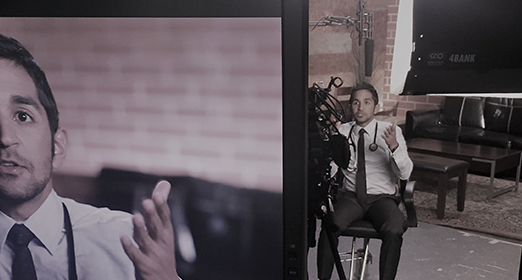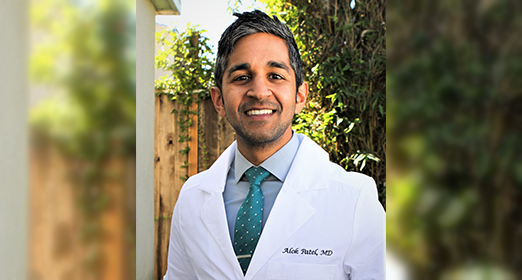Sometimes when Alok Patel, MD, walks into a patient’s room, he’ll catch a glimpse of his own face on the television. It can come as a surprise to his patients, who may not know that their doctor wears two different but complementary hats. By day, Patel is a medical journalist and media expert, explaining complicated public health issues.
At night, he works as a hospitalist at Lucile Packard Children’s Hospital, where he cares for children throughout the hospital—in collaboration with primary care physicians, specialists, and surgeons—to provide comprehensive care during their stay.
“By having a career in media while working in pediatric medicine, I get to exercise every side of my personality,” says Patel.
On at least one occasion, he played both roles back to back, appearing on the news still wearing his scrubs from his hospital shift the night before.
When the COVID-19 pandemic emerged, Patel became a sought-after medical expert.
“I remember doing a spot in February of 2020,” says Patel, recalling how he shared the spotlight with a network news host. “We kept the conversation casual but informative. It was like a chat between friends, and that’s how I developed my style for talking about the pandemic.”
Patel now appears frequently on local and national media, providing a pediatrician’s perspective on timely topics such as vaccine safety, mask mandates in schools, and the science behind the latest headlines.
His on-camera messages about COVID-19 aren’t that different from the conversations he has with patients and their families every day. “Essentially, we communicate about the risks to keep people prepared but not anxious,” he says.
It also helps to put himself in the viewers’ shoes. Whether speaking to an older audience on broadcast TV or to Generation Z on social media, Patel frames his tone accordingly, often sprinkling in some humor. Meanwhile, he encourages his fellow health care providers to join the conversation.
“I tell them that if we don’t talk about medicine, somebody else is going to do it,” Patel says, “and they might be misinformed and spread misinformation to millions of people.”
The politicization of the pandemic has added a layer of complexity to his communication approach.
“The last thing we want to do is alienate someone who may believe something different than we do,” Patel explains. “We’re trying to spread information in an understandable, relatable fashion. I think doing this broadly, without insulting people, is what we have to do.”
As for the future, Patel hopes both sides of his career continue to evolve. He is always looking for new ways to answer people’s most common health questions and make sense of complicated medical headlines so that they can keep themselves and their families healthy.
This article originally appeared in the Fall 2021 edition of Packard Children's News.

